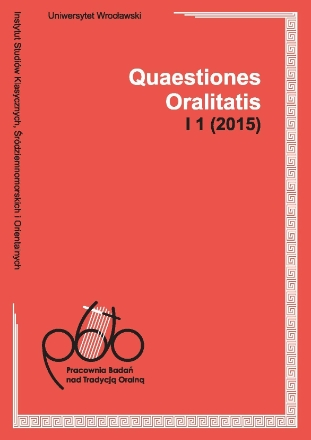Innowacje mitograficzne w kulturze antycznej między oralnością a piśmiennością
Mythological Innovation between Orality and Literacy inAncient Culture
Author(s): Tomasz MojsikSubject(s): History, Anthropology, Social Sciences, Cultural history, Ancient World, Cultural Anthropology / Ethnology, Culture and social structure
Published by: Wydawnictwo Uniwersytetu Wrocławskiego
Summary/Abstract: This article aims to investigate the circumstances of the function of the ‘discrepancy’ in mythical stories between orality and literacy as well as the practical considerations of composition in the oral era. My analysis is based on the assumption that in response to a change in the methods of the modification and perception of myths one can posit that there was a change in the method of communication – a transition from orality to (the superior) literacy. For we see in the sources a movement from what was typical of the archaic period and of part of the classical era – the liberal creation of new versions of myth – to their compilation, sorting and explanation, and also to the search for rarer (but attested) modifications of known stories in the form of texts, rather than in their oral form. Along with the emergence of book collections and the possibility of comparing the texts as extracted from their contexts, there was also an evident change in the evaluation of the stories and their constituent elements. Callimachus’ words – ἀμάρτυρον οὐδἐν ἀείδω – are here an emphatic expression of this tendency in the Hellenistic era. The use in relation to earlier eras of the terms ‘change’ or ‘discrepancy’ in the context of mythical stories is, however, rather a shorthand for historiography. We cannot speak of change in a world in which the actual and accepted (by a group of listeners) version of a myth displaces and replaces other versions. There is no space here for contradictions or discrepancies; it is at most a question of upgrading. Discrepancies are, however, the creation of the era of writing, which come from the explanations of the Greeks themselves, for instance those of the Hellenistic period, and which end in the discursive explanations of contemporary scholars.
Journal: Quaestiones Oralitatis
- Issue Year: 1/2015
- Issue No: 1
- Page Range: 51-76
- Page Count: 26
- Language: Polish

